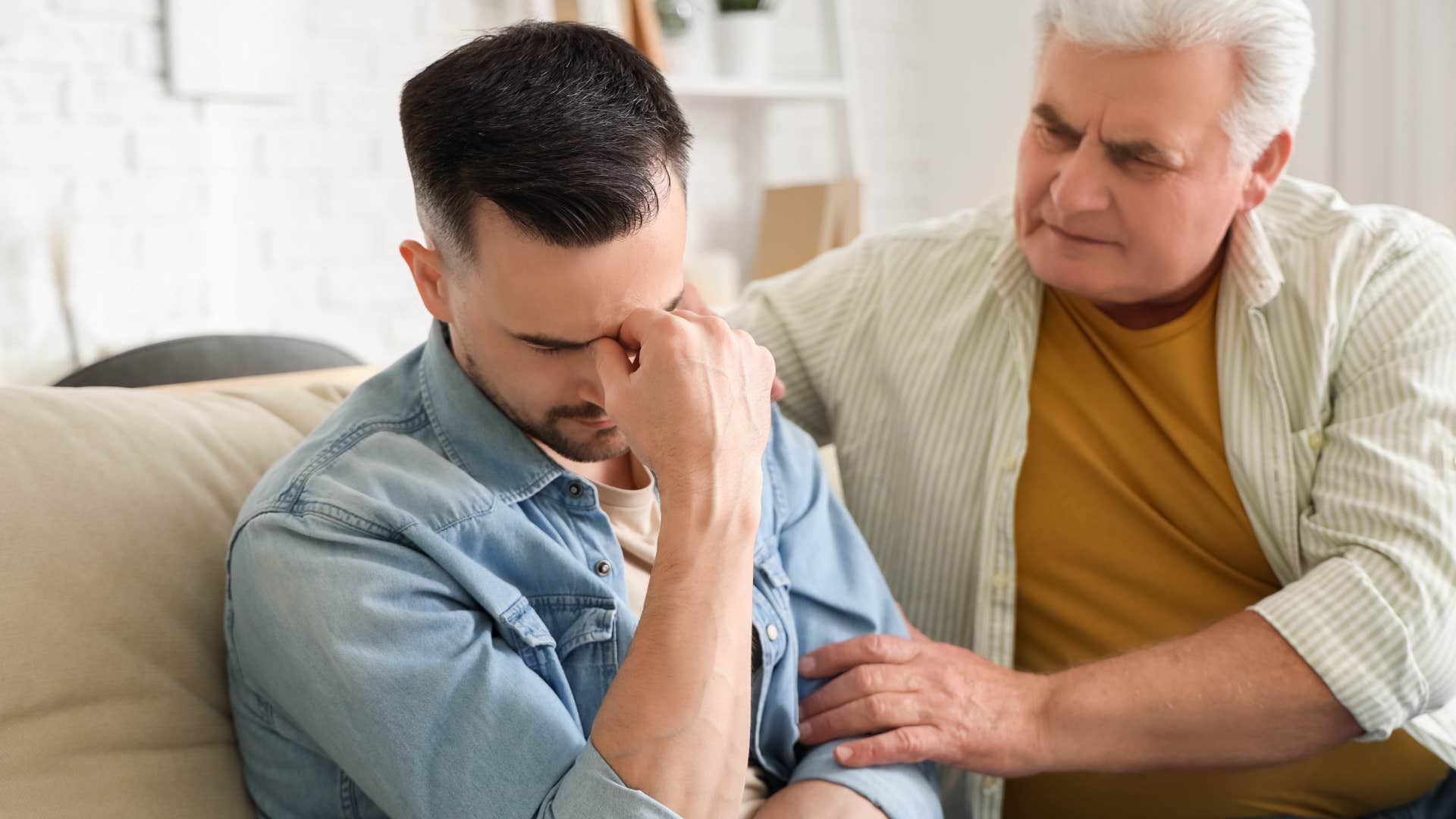10 Quiet Habits Of People Who Are Secretly Struggling Inside
Supporting the people in your life starts by recognizing the signs they need help.
 Stage65 Porduction | Shutterstock.com
Stage65 Porduction | Shutterstock.com While there are certainly overt signs of mental illness, according to experts from the Mayo Clinic, that a struggling person's friend, family, and even co-workers might be able to notice, there are also a number of quiet habits of people who are secretly struggling inside. Whether it's a fear of burdening others or an insecurity about their mental health that's driving them to avoid asking for help, recognizing these behaviors can be key to supporting someone in your life who may be in trouble.
Depending on your relationship or the situation, there could be specific ways to help support someone struggling with mental health in your life, but the most important thing is to make sure they feel supported, loved, and heard. If you can cultivate a safe space for them in your relationship, you create a space where they feel comfortable seeking out help and support, rather than feeling forced to express themselves.
Here are 10 quiet habits of people who are secretly struggling inside
1. They avoid vulnerable conversations
 F01 Photo | Shutterstock
F01 Photo | Shutterstock
Many people who struggle to express or regulate their emotions still experience emotional turmoil, but they have much less control over how it erupts when they do need to vent or express themselves.
While it might be a temporary coping mechanism for someone who's struggling to avoid vulnerability and suppress their emotions, their uncomfortable feelings will never dissipate on their own.
Especially as these negative thoughts continue to spiral and isolate a person who's struggling, avoiding vulnerability only further damages self-esteem, forcing people to believe a misguided truth that they're burdening others by sharing their emotions.
A study published in the Journal of Personality and Social Psychology argues that it's not just emotional instability that suppression causes, but general social isolation — making people feel less connected to the people around them and generally more unsatisfied and fulfilled in their lives.
2. They cancel plans last-minute
 Bricolage | Shutterstock
Bricolage | Shutterstock
Many people who are struggling internally suffer from mood swings as a result of their suppressed emotions and sometimes isolated routine away from social connection.
When these struggling individuals do feel optimistic and make plans with people, it's not uncommon for them to cancel at the last minute or make an excuse for why they can't come, failing to keep their commitments, sparking doubt in their relationships, and further isolating themselves at home.
While they might be able to acknowledge that social isolation helps to combat symptoms of depression and anxiety, like experts from Harvard Health suggest, they still fall into a toxic cycle of isolation that sparks loneliness.
3. They're always tired
 Pixel-Shot | Shutterstock
Pixel-Shot | Shutterstock
Fatigue, brain fog, and general exhaustion are some of the quiet habits of people who are secretly struggling inside, most commonly with depressive symptoms, according to a study published in Innovations in Clinical Neuroscience.
While it might seem unsuspecting at first, if someone in your life is constantly feeling burnt out and exhausted, there might be something more to their story than simply overworking themselves.
Healthy relationships and friendships are centered around supporting each other, but sometimes it takes a bit of pattern recognition and vulnerability to figure out what the struggling people in your life truly need.
4. They're not doing their favorite activities or hobbies anymore
 pikselstock | Shutterstock
pikselstock | Shutterstock
While many people struggling with stress, grief, or burnout step away from their interests, favorite activities, and hobbies for a period of time to focus their energy elsewhere, according to psychiatrist Michael Roman, it can also be one of the quiet habits of people who are secretly struggling inside with depression or more severe mental health concerns.
Not only is this distance between hobbies and a struggling person a sign of their depression, it also sparks a toxic cycle of isolation where they're no longer prioritizing engaging in the things that bring them clarity, joy, and peace.
As a friend or partner, it can be helpful to nudge a struggling person in the right direction, back towards the things they enjoy doing. At the very least, creating a safe space for them to vent their struggles and frustrations without judgment could give them a bit of empowerment to return to the things they enjoy in their routine.
5. They're physically not taking care of themselves
 ViDI Studio | Shutterstock
ViDI Studio | Shutterstock
Whether it's following their normal workout routine, getting out of the house, or completely neglecting their personal hygiene, someone who's struggling internally may not have energy or motivation to take care of themselves on the outside.
Grappling with mental illness and emotional turmoil can become taxing, urging people to avoid time-consuming activities and even their most basic responsibilities, like taking a shower or brushing their teeth.
According to the National Alliance on Mental Health, poor personal hygiene is one of the most common, yet least discussed and acknowledged, symptoms of depression, because it's often taboo to discuss in romantic relationships or in older generations.
It seems simple in theory to take a shower or use self-discipline to knock out the chores, but in a person struggling with depression, it's much more complicated than simply "being motivated."
6. Their sleep schedule changed
 DC Studio | Shutterstock
DC Studio | Shutterstock
Oversleeping can be one of the quiet habits of people who are secretly struggling inside, but any drastic changes to a sleep schedule can be a sign that a person's dealing with mental health concerns.
According to experts from the Cleveland Clinic, oversleeping is often a coping mechanism for people struggling with depression, as it's a direct response to avoiding uncomfortable emotions and combating the fatigue associated with emotional burden. Another study from Psychiatry Research also links feelings of loneliness to insomnia and a lack of quality sleep in adults.
When you're not getting quality sleep or ruminating at night with your emotional burdens, it's not surprising that your sleep schedule would suffer as a result, but it's important for other people to notice so they can show up to support someone who's struggling in their life.
7. They're more irritable or angry
 StratfordProductions | Shutterstock
StratfordProductions | Shutterstock
According to a 2022 study on depression, irritability is typically linked with depression, urging people who are struggling internally and suppressing emotions to lash out on others. In relationships, this can inherently cause tension, as struggling individuals further isolate themselves from open communication and productive interactions.
By noticing these mood swings and a shift in a person's temperament, loved ones of a person struggling with depression or another mental illness can step in to help support them, whether it's by cultivating a safe space for emotional expression or simply showing up for them physically.
8. They struggle to concentrate and focus
 simona pilolla 2 | Shutterstock
simona pilolla 2 | Shutterstock
Experiencing fatigue and exhaustion doesn't just impact a struggling person's physical demeanor, it can also make it more difficult for them to concentrate and focus in their daily lives.
Whether it's actively listening in a conversation, going to work, or completing a task, everyday responsibilities often feel much harder for a person battling internal struggles and emotional turmoil.
According to a study published in Translational Psychiatry, outside of daily impairments and struggles with responsibilities, this depressive fatigue can also contribute to cognitive declines in other areas like memory, decision-making, and social connection.
With so much mental energy and anxiety focused on their trauma or emotional turmoil, it's not uncommon for people struggling with depression to essentially "shut down" in other areas of their lives to compensate.
9. They complain about sickness and physical ailments more often
 Chay_Tee | Shutterstock
Chay_Tee | Shutterstock
A 2004 study on depression found that many struggling individuals tend to adopt and notice physical ailments and biological sickness before they recognize the larger emotional symptoms of depression.
From chronic headaches, to digestion problems, fatigue, and appetite changes, the neurotransmitters and hormones linked to our emotions — the same ones that are affected from depression or anxiety — are just as deeply ingrained in our physical experience as our mental one.
While many people struggling with physical illness aren't necessarily struggling from depression or emotional turmoil, it can be one of the first subtle signs of a person who needs support from their loved ones and a safe space to vent.
10. They struggle to make decisions
 fizkes | Shutterstock
fizkes | Shutterstock
Coupled with struggles concentrating and focusing in their daily lives, one of the quiet habits of people who are secretly struggling inside is their inability to make concrete decisions.
Whether it's crafting a healthy routine, adopting new habits, or even making plans with their friends and loved ones, a person struggling with depression or other mental illnesses often has little brain power and energy left to commit to critical thinking and self-reflection.
If you or somebody you know is experiencing a mental health crisis, help is available. Call SAMHSA's National Helpline at 1-800-662-HELP (4357) or text "HELLO" to 741741 to be connected with the Crisis Text Line.
Zayda Slabbekoorn is a staff writer with a bachelor's degree in social relations & policy and gender studies who focuses on psychology, relationships, self-help, and human interest stories.

